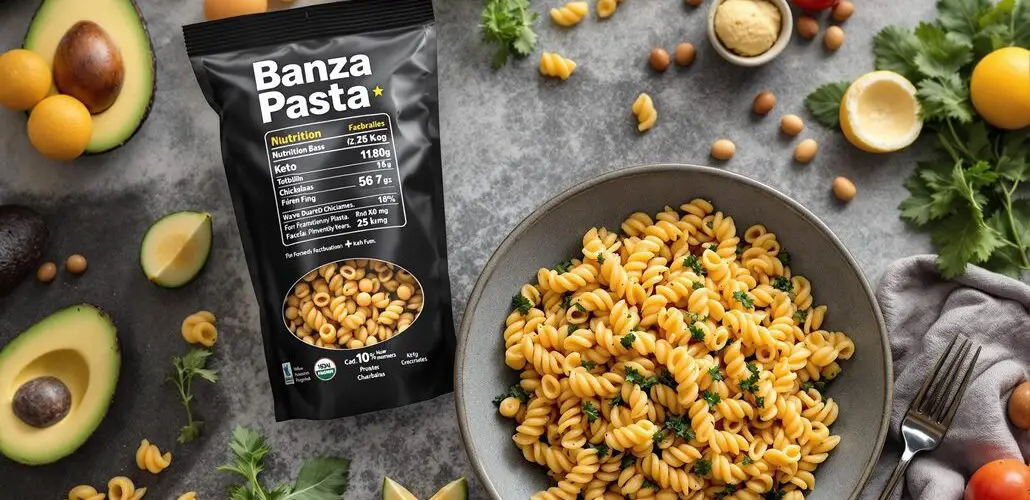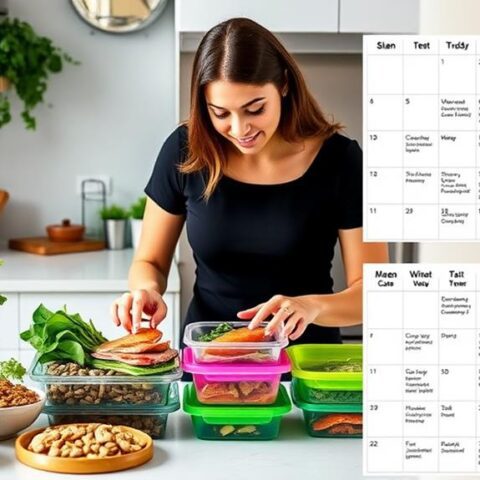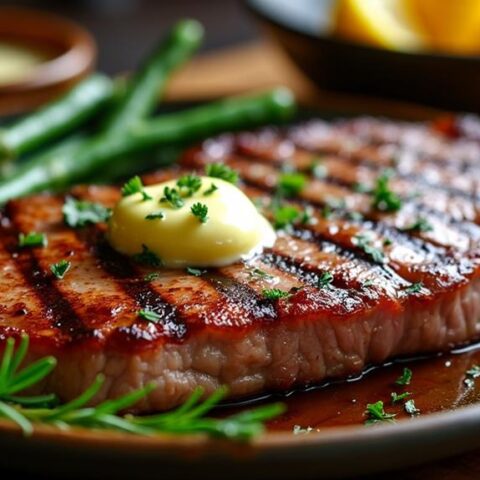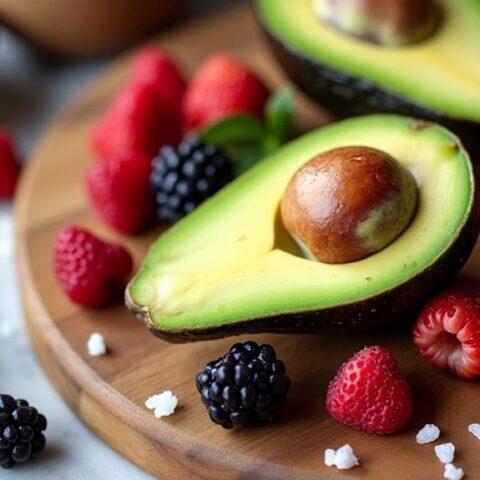
Banza pasta may be unsuitable for a keto diet due to its high net carbohydrate content, which greatly exceeds the daily limits required for maintaining ketosis. With around 26 grams of net carbs per serving, it can easily disrupt fat metabolism and raise blood sugar levels. Its minimal fat content and increased sodium levels further complicate adherence to keto principles, which emphasize high fat and low carb intake. Additionally, frequent consumption of Banza pasta may impair weight loss efforts and hinder ketosis. Those seeking alternatives that align with keto values have several lower-carb options to explore for better metabolic outcomes.
Key Takeaways
- Banza pasta's high carbohydrate content disrupts ketosis and fat metabolism, hindering keto weight loss goals.
- A single serving of Banza pasta can exceed the daily carb limits for ketogenic diets.
- Low-fat levels in Banza pasta conflict with the keto requirement of high-fat intake for energy.
- Banza pasta's sodium content can cause water retention and disrupt electrolyte balance on a keto diet.
- Better low-carb alternatives like zucchini noodles and Shirataki noodles support ketosis more effectively.
High Carbohydrate Content
Banza pasta, made from chickpeas, contains a substantial amount of carbohydrates that may not align with the requirements of a ketogenic diet. With approximately 32 grams of net carbs per 100 grams, Banza pasta presents a considerable challenge for those aiming to maintain a state of ketosis.
The high carbohydrate content is particularly concerning for individuals on a strict ketogenic diet, where the typical daily carb limit ranges from 20 to 50 grams. This threshold is essential for achieving and sustaining ketosis, a metabolic state vital for effective fat burning. The ketogenic diet is known for its ability to markedly reduce blood glucose levels and enhance insulin sensitivity, which is especially beneficial for managing type 2 diabetes.
Each serving of Banza pasta, roughly equivalent to 2 ounces dry, contains about 26 grams of net carbs per serving. This level of carbohydrate intake can easily exceed the daily limits set by keto practitioners, thus complicating efforts to stay in ketosis.
While Banza pasta is lower in carbohydrates compared to traditional wheat pasta, its reduction is insufficient for those committed to a strict keto regimen. As a result, Banza cannot be classified as a keto-friendly pasta, as its consumption may impede weight loss goals and potentially raise blood sugar levels.
Hence, careful consideration is advised for those adhering to ketogenic principles.
Exceeds Keto Carb Limits
Banza pasta, with its approximately 26 grams of net carbs per serving, greatly surpasses the carbohydrate limits of a strict ketogenic diet, which typically ranges from 20 to 50 grams per day.
This high net carb content poses a challenge for maintaining ketosis, as even a single serving can consume a substantial portion of the daily carb allowance.
Achieving ketosis typically requires disciplined eating to maintain such low carbohydrate intake, and excess carbs from foods like Banza pasta can hinder this metabolic state.
Consequently, individuals following a keto diet might need to practice strict portion control or consider alternative low-carb pasta options to prevent disruption of their metabolic state.
High Net Carb Content
When considering foods for a ketogenic diet, one must be mindful of carbohydrate content, as it plays an essential role in maintaining ketosis. Banza pasta, derived from chickpeas, presents challenges due to its high carb content, making it less suitable for those committed to a ketogenic lifestyle.
With approximately 32 grams of net carbs per 100 grams, Banza pasta exceeds the typical keto daily carb limit of 20-50 grams. Even a single serving of Banza pasta, around 56 grams dry, contains about 18 grams of net carbs per serving. This substantial carbohydrate content can greatly impact daily allowances, potentially hindering weight loss efforts by disrupting ketosis.
For individuals aiming to adhere strictly to a ketogenic diet, even Banza's lower net carb count compared to traditional pasta remains problematic. To maintain ketosis and support weight loss objectives, careful monitoring and limitation of carbohydrate intake are imperative.
Banza pasta's net carb content can easily surpass these limits, making it an unsuitable option.
- Net Carb Content: Approximately 32 grams per 100 grams.
- Single Serving Impact: 18 grams of net carbs per 56 grams dry.
- Keto Daily Limit: Typically 20-50 grams.
- Chickpea-Based: Source of carbohydrates.
- Dietary Monitoring: Essential for ketosis maintenance.
Disrupts Ketosis Easily
Maintaining a state of ketosis is essential for the success of a ketogenic diet, yet the significant carbohydrate content in chickpea-based Banza pasta can easily disrupt this metabolic state. With approximately 32 grams of net carbs per 100 grams, Banza pasta exceeds the typical daily net carb limit of 20-50 grams recommended for ketogenic diets.
This high in carbs content can be particularly problematic as it disrupts ketosis, preventing the body from efficiently burning fat for energy. The consumption of even small servings of Banza pasta can contribute to raised blood sugar levels, hindering the primary objective of a keto diet, which is to maintain low insulin levels and promote fat metabolism.
Such carbohydrate-induced energy fluctuations can destabilize the consistent fat-burning state that ketosis requires. For individuals committed to a strict keto regimen, these net carbs per serving can rapidly accumulate, making it challenging to stay within the desired carbohydrate threshold necessary for effective ketosis.
Although Banza pasta offers nutritional advantages like higher protein and fiber, its high carbohydrate levels make it incompatible with the fundamental principles of a ketogenic diet. Consequently, it poses a significant barrier to maintaining ketosis.
Limited Daily Carb Allowance
Chickpea-based pasta alternatives, such as Banza, present a challenge for individuals adhering to a ketogenic diet due to their carbohydrate content that often exceeds the limited daily carb allowance.
With approximately 25 grams of net carbs per serving, Banza pasta can quickly surpass the strict keto guidelines, which generally recommend a daily carb intake of 20-50 grams. This high carb content not only occupies a substantial portion of the daily carb allowance but also limits the inclusion of other essential nutrient sources.
The implications of consuming Banza pasta for keto dieters include:
- Exceeding Net Carb Limits: One serving can utilize the entire daily carb allowance.
- Restricted Carb Intake: Limits the ability to consume other foods containing carbs.
- Elevated Blood Sugar Levels: High carbs can spike blood sugar, disrupting ketosis.
- Weight Loss Challenges: Regular consumption may hinder weight loss efforts.
- Ketosis Disruption: Maintaining ketosis becomes difficult with high net carb intake.
Although Banza pasta offers a lower net carb option compared to traditional pasta, its carbohydrate content remains incompatible with the low-carb requirements of a ketogenic diet, potentially jeopardizing the metabolic state vital for achieving desired health outcomes.
Disrupts Ketosis State
The excessive carbohydrate content found in Banza pasta poses significant challenges to maintaining a state of ketosis, as it can cause the body to shift from fat metabolism back to glucose utilization.
This shift is primarily due to the high net carb count, which can disrupt the delicate metabolic balance required for effective fat burning.
For instance, the Keto diet requires a very low carbohydrate intake of around 20-50 grams daily to induce ketosis, where the body relies on fat as the primary energy source.
Consequently, regular consumption of Banza pasta may hinder the ketogenic diet's intended benefits, such as sustained energy levels and weight management.
Excessive Carbohydrate Content
For individuals adhering to a ketogenic diet, the carbohydrate content of their food choices is of paramount importance. Banza pasta, with its approximately 32 grams of net carbs per serving, presents a significant challenge. This excessive carb content can easily surpass the daily carbohydrate allowance for those on a strict keto regimen, typically ranging between 20 to 50 grams.
The high carbohydrate content found in Banza pasta may disrupt ketosis, the metabolic state where the body utilizes fat instead of carbohydrates for energy. In addition, consuming such a product can lead to heightened blood sugar levels, potentially undermining the primary goal of maintaining stable blood glucose levels.
- Net Carbs Per Serving: Banza pasta exceeds typical keto limits with 32 grams.
- Disruption of Ketosis: High carb content can shift metabolism away from fat reliance.
- Blood Sugar Impact: May lead to increased blood sugar levels.
- Energy Fluctuations: Carbohydrate-heavy foods can cause energy variability.
- Dietary Monitoring: Individuals must closely track intake to remain within keto parameters.
With these considerations, the excessive carbohydrate content of Banza pasta necessitates careful monitoring and possible avoidance to maintain the desired ketogenic state.
Metabolism Shift Challenges
Often overlooked in dietary planning, the metabolism shift challenges posed by Banza pasta stem from its substantial carbohydrate content, which is likely to disrupt the state of ketosis. A key issue lies in the high carbs present, with Banza pasta offering approximately 26 grams of net carbs per serving. This figure can easily surpass the daily carbohydrate limit recommended for maintaining a ketogenic diet, which typically ranges between 20-50 grams.
When the body's metabolic state of ketosis is disrupted by such high carbohydrate intake, it shifts from utilizing fat as the primary fuel source back to carbohydrates. This metabolic change is problematic for individuals committed to a ketogenic diet, as consuming Banza pasta can lead to increased blood sugar levels.
Such increases are counterproductive to sustaining ketosis, as they trigger insulin responses that favor glycogen storage rather than fat burning. For strict keto adherents, even a modest serving could hinder the necessary shift towards fat metabolism, leading to potential energy fluctuations and weight gain.
The presence of 33 grams of total carbohydrates in Banza pasta underscores the crucial importance of vigilant carb monitoring to prevent unintended exits from ketosis.
Potential Weight Gain
Although Banza pasta is a popular choice for those seeking gluten-free or high-protein alternatives, its compatibility with a keto diet is questionable due to its carbohydrate content. Each serving of Banza pasta contains approximately 30 grams of net carbs, which can considerably exceed the daily carb limit of 20-50 grams recommended for those adhering to a ketogenic diet.
This high carbohydrate content can disrupt ketosis, the metabolic state essential for burning fat instead of carbohydrates, potentially leading to weight gain. Furthermore, the caloric intake from Banza pasta is substantial, with about 190 calories per serving, making it easy to surpass daily caloric needs and hinder weight loss objectives.
As the ketogenic diet relies heavily on low-carb intake to maintain ketosis and regulate insulin levels, incorporating high-carb foods like Banza pasta could counteract these benefits.
- High Carbs: 30 grams of net carbs per serving can exceed keto limits.
- Weight Gain: Disruption of ketosis may lead to fat storage.
- Carbohydrate Content: May shift energy metabolism back to carbs.
- Caloric Intake: 190 calories per serving can contribute to excess caloric consumption.
- Alternative Options: Substituting with low-carb alternatives can help maintain a caloric deficit.
For individuals on a keto diet, opting for low-carb pasta alternatives may prove beneficial in achieving weight management goals without the risk of potential weight gain.
Raises Blood Sugar Levels
Banza pasta's high glycemic index and substantial net carbohydrate content can considerably raise blood sugar levels, posing challenges for individuals managing carbohydrate intake.
This rise can trigger an insulin spike, which may undermine the metabolic objectives of a ketogenic diet focused on maintaining ketosis.
Consequently, Banza pasta may not be an ideal choice for those seeking to control blood glucose levels or sustain a state of ketosis.
High Glycemic Impact
Regularly, the choice of pasta can considerably influence blood sugar levels, especially for those monitoring their glycemic response. Banza pasta, while possessing a low glycemic index, can still lead to a blood sugar spike due to its carbohydrate content.
With approximately 26 grams of net carbs per serving, it presents a challenge for those on a strict ketogenic diet aiming to maintain ketosis. Despite its fiber content, the rapid digestion of carbohydrates in Banza pasta can raise blood sugar levels, complicating efforts to keep stable glycemic responses. This is particularly concerning for individuals who are vigilant about their carbohydrate intake and its impact on their metabolic state.
Factors contributing to the high glycemic impact of Banza pasta include:
- Net carbs per serving: Despite its low glycemic index, the net carbs are significant.
- Carbohydrate content: High enough to potentially disrupt ketosis.
- Portion size: Larger servings can intensify the blood sugar spike.
- Rate of digestion: Rapid carbohydrate digestion leads to increased blood sugar.
- Keto diet considerations: May hinder maintaining ketosis due to carbohydrate load.
Such factors should be carefully evaluated by those adhering to a keto diet to prevent unintended glycemic disruptions.
Carb-Induced Insulin Spike
How does the carbohydrate content in Banza pasta trigger an insulin spike, and what implications does this have for those on a ketogenic diet? Banza pasta contains approximately 26 grams of net carbs per serving. This high-carb content can greatly impact individuals following a keto diet, which typically restricts daily carbohydrate intake to around 20-50 grams to maintain ketosis.
Consuming Banza pasta can lead to an insulin spike, as the body responds to the influx of carbohydrates by releasing insulin to manage rising blood sugar levels. The glycemic index of Banza pasta is higher than that of many keto-friendly alternatives, causing a faster increase in blood sugar levels post-consumption.
This rapid elevation disrupts ketosis by shifting the body's focus from burning fat to managing the increased glucose. For those adhering to a strict ketogenic regimen, even small servings of Banza pasta can lead to fluctuations in blood sugar levels, undermining the diet's primary objective of maintaining a low insulin environment conducive to fat metabolism.
Consequently, the high net carbs and glycemic index of Banza pasta make it an unsuitable option for those attempting to achieve and sustain ketosis.
Contains Legumes
Chickpeas, a type of legume, are the primary ingredient in Banza pasta, which greatly affects its suitability for a ketogenic diet. Despite being marketed as a "Chickpea Pasta Healthy" option, it contains considerable carbs, with approximately 42.14 grams of net carbs per 100 grams. This is far from being low in carbs, exceeding the typical keto daily limit of 20-50 grams of net carbs.
Additionally, starchy vegetables like chickpeas can disrupt ketosis due to their high carbohydrate content. Consequently, the presence of chickpeas makes Banza pasta unsuitable for individuals strictly following a ketogenic diet, as the high carbohydrate content can hinder the body's ability to maintain ketosis.
While legumes like chickpeas offer nutritional benefits such as protein and fiber, they pose challenges for those on a keto diet. The inclusion of legumes in Banza pasta results in a carbohydrate profile that is not aligned with the principles of a keto-friendly nutritional plan.
Here are key points to reflect upon:
- Chickpeas are inherently high in carbohydrates.
- Net carb content in Banza pasta notably surpasses keto limits.
- Legumes disrupt ketosis due to heightened carbohydrate levels.
- Nutritional benefits of legumes may not outweigh keto concerns.
- Avoiding legumes is advisable to sustain ketosis and fat-burning.
Minimal Fat Content
Banza pasta's minimal fat content poses a significant challenge for those adhering to a ketogenic diet. With approximately 3.5 grams of fat per serving, Banza pasta falls short of the macronutrient ratios essential for maintaining ketosis. The keto diet requires around 70% of daily caloric intake to come from fats, emphasizing high-fat consumption. This dietary framework is designed to shift the body's primary energy source from carbohydrates to fats, thereby promoting fat burning.
Additionally, the keto diet prioritizes healthy fats from sources like avocados and nuts, which Banza does not provide. Consequently, Banza's low-fat profile does not align with these macronutrient guidelines.
In addition to its minimal fat content, Banza pasta focuses on protein and carbohydrates, which further detracts from its suitability for a keto diet. The absence of sufficient fatty acids in Banza's composition means it cannot provide the necessary energy for those attempting to sustain ketosis.
In contrast, the keto diet typically incorporates foods high in healthy fats, such as avocados, nuts, and oils, to meet its fat intake requirements. Consequently, the low-fat content in Banza pasta makes it an unsuitable choice for individuals aiming to adhere to the ketogenic dietary protocol, limiting its utility in this specific nutritional context.
High Sodium Levels
Raised sodium levels in Banza pasta present a notable concern for individuals on a ketogenic diet, where monitoring sodium intake is essential for maintaining ideal health. A typical serving of Banza pasta contains approximately 400-500 mg of sodium, which could pose challenges for those aiming to adhere to the dietary restrictions of a keto diet.
Excessive sodium intake is associated with water retention and increased blood pressure, escalating the risk of cardiovascular issues. High sodium levels can disrupt the balance of electrolytes, potentially hindering the body's ability to maintain ketosis—a significant aspect of the keto diet.
It is important to note that regular monitoring of cholesterol through lipid panel testing is also essential for health management on a keto diet. Here are several points to evaluate:
- Sodium and Water Retention: Increased sodium levels can lead to increased water retention, counteracting weight loss efforts.
- Blood Pressure Concerns: Overconsumption of sodium can contribute to heightened blood pressure, a major factor in cardiovascular issues.
- Electrolyte Imbalance: High sodium intake may lead to dehydration and affect electrolyte balance, important for ketosis.
- Dietary Restrictions: Keto diets often necessitate reduced sodium intake, making high-sodium foods less compatible.
- Alternative Options: Exploring lower sodium alternatives may align better with keto dietary goals.
Thus, careful evaluation of sodium intake is essential for those committed to a keto lifestyle.
Limited Keto Compatibility
A notable limitation in the keto compatibility of Banza pasta is its considerable carbohydrate content, with approximately 32 grams of net carbs per 85-gram serving.
For individuals adhering to a strict ketogenic diet, which typically restricts daily carbohydrate intake to between 20 to 50 grams, consuming Banza pasta could easily exceed these limits. Consequently, this high carb content poses a risk of disrupting ketosis, the metabolic state where the body burns fat for energy instead of carbohydrates.
Furthermore, achieving hormonal regulation that aids in weight loss could be impacted by such high carbohydrate intake. Despite its reputation as a healthier alternative to traditional pasta, Banza pasta's macronutrient profile remains less favorable for those on a ketogenic diet.
It offers a higher carbohydrate and lower fat composition, diverging from the ideal keto ratio of 70% fat, 20-25% protein, and 5-10% carbs. In contrast, keto-friendly alternatives like zucchini noodles or shirataki noodles provide considerably fewer carbohydrates, making them more suitable for maintaining ketosis.
Individuals following a ketogenic diet must exercise caution with Banza pasta, as even small portions can impede progress. Recognizing the potential impact of its carbohydrate content is essential for those committed to achieving and sustaining the metabolic state of ketosis.
Better Low-Carb Alternatives
Given the carbohydrate constraints inherent in a ketogenic diet, exploring viable low-carb alternatives to Banza pasta becomes paramount for individuals seeking to maintain ketosis. Banza pasta, primarily made from chickpeas, may not align with the stringent carbohydrate limits of a keto diet.
Fortunately, several low-carb alternatives offer both diversity and nutritional adequacy for keto adherents. The inclusion of keto-friendly vegetables can further enhance nutrient intake while supporting ketosis.
- Zucchini Noodles (Zoodles): These noodles offer a versatile, low-carb substitute with approximately 2 grams of net carbs per cup, making them an excellent choice for those on a keto diet.
- Shirataki Noodles: Known as "miracle noodles," they are derived from konjac root and contain less than 1 gram of net carbs per serving, appealing to those seeking minimal carb intake.
- Spaghetti Squash: This vegetable, with its pasta-like texture, provides about 10 grams of net carbs per cup and can be incorporated into a variety of dishes.
- Palmini Pasta: Made from hearts of palm, it contains roughly 4 grams of net carbs per serving and offers a gluten-free option compatible with keto diets.
- Almond Flour Pasta: Although higher in carbs than other alternatives, it offers a reduced carbohydrate content compared to traditional pasta, with 10-15 grams of net carbs per serving.
Frequently Asked Questions
Can You Have Banza Pasta on Keto?
Banza pasta, due to its high carbohydrate content, is generally not considered keto-friendly. For those adhering to ketogenic diets, alternatives such as zucchini noodles or shirataki noodles offer low-carb options. Nutritional comparisons favor these alternatives for ketosis maintenance.
Is Banza Unsafe to Eat?
Banza pasta is not inherently unsafe to eat. Its nutritional content, including high protein and fiber, offers health benefits. However, individuals with dietary restrictions should consider ingredient sourcing and carbohydrate content before incorporating it into their diet.
Why Is Pasta Not Keto?
Pasta, including alternatives, is generally high in carbohydrates, making it unsuitable for a ketogenic diet. Keto-friendly grains and low-carb recipes emphasize meal planning to maintain low carbohydrate intake, essential for achieving and sustaining ketosis.
Does Banza Pasta Have a Lot of Carbs?
Banza pasta contains approximately 30 grams of net carbs per serving, making it relatively high in carbohydrates. However, compared to traditional pasta, it offers a lower-carb alternative. Portion control and dietary preferences are essential in its nutritional comparison.
Conclusion
Banza pasta, primarily composed of chickpeas, presents several challenges for those adhering to a ketogenic diet. The high carbohydrate content can exceed typical keto carb limits, potentially disrupting ketosis and leading to weight gain and increased blood sugar levels. Furthermore, Banza pasta offers minimal fat content, which is essential for keto, and contains high sodium levels. Given these factors, Banza pasta is less compatible with keto guidelines compared to other low-carb alternatives, necessitating careful dietary consideration.









No Comments